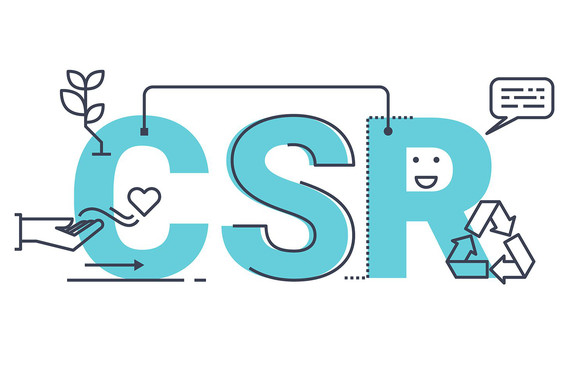Table of contents
Starbucks pledged to donate 50 million meals by the year 2020 by taking unsold, leftover food from its stores and donating it to food banks. Not only does this help the underfed in many communities, but also it cuts down on the chain’s food waste. This is just one example of corporate social responsibility.
Corporate social responsibility is all about companies taking accountability for their business impact. They usually do this by delivering social, environmental, or economical benefits to their communities.
CSR can have a big impact on a business’s community, but it can also bolster a brand’s reputation. A Cone Communications survey found that 87% of Americans would purchase a product because a company advocated for an issue they cared about.
But CSR programs aren’t just for giant companies like Starbucks. Any business can benefit from CSR. Here’s what you need to know to get started.
What is corporate social responsibility?
Corporate social responsibility is your business’s way of making a positive impact on society, and you have the opportunity to make a difference in numerous ways.
The types of CSR programs that businesses create usually fall into a few categories:
Community involvement
Some companies choose to get involved with the community in an effort to promote corporate social responsibility. This includes partnering with nonprofit organizations, schools, or shelters to create some kind of impact.
Environmental sustainability
Others focus on their environmental footprint and create sustainability initiatives that promote going green.
Businesses use online invoices when billing their customers for services because it provides an easy form of payment that is not only efficient, but can also save you money. Others may switch to digital receipts as a way to reduce paper consumption. These are simple changes that can decrease your operational costs and support sustainability.
Political support
While this might not be the way to go for all businesses, a growing number of companies are vocalizing their beliefs and publicly supporting political issues. Some are even taking action when they feel like political issues conflict with the beliefs of their companies.
Pro Bono Work
Other companies hone in on their expertise to create impact. Whether it’s building a pro bono program or offering educational classes, there are various ways you can use your employees’ expertise beyond daily job duties.
What is the purpose of corporate social responsibility?
This all sounds great, but business owners are busy and it’s difficult to prioritize social efforts among their never-ending list of business responsibilities. So how can CSR add value to the overall business so it’s easier to prioritize?
Here are some benefits of corporate social responsibility:
- It can have a positive impact in the community. You are a member of your community, as are your employees. Wouldn’t you like to make it better? Improving your community creates a better quality of life for you and your employees, and your customers. (And happier customers are always better for business.)
- It can improve reputation and brand image. Studies show that reputation is often more important than your business offering, and a socially responsible company is perceived as a better company when stacked against competitors.
- It can create consumer loyalty. Consumers are “buying on belief,” meaning they are more inclined to buy from brands that align similarly with their social or political values. A corporate social responsibility program can entice a customer to try your business, and it’s a great way to create loyalty.
- It can impact the bottom line. Improved reputation and loyalty can lead to better revenue. But, your CSR efforts can also save you money by driving efficiency in your business operations.
- It can empower your employees. Think about a time when you really believed in something you were doing. You were more inspired, more engaged, more empowered. When you communicate your business’s values through CSR programs, you’re bound to see an effect on your employees, as well as in your community.
5 examples of CSR policies in action.
Below are five examples of corporate social responsibility implemented by notable companies.
- BMW has a CSR policy that is considered one of the top in its industry. The company recently partnered with a UN initiative to launch an Intercultural Innovation Award, which supports grassroots programs that encourage intercultural dialogue and cooperation.
- Levi’s focuses on decreasing its environmental footprint by creating a more sustainable supply chain. Through the Worker Well-Being initiative, Levi’s partners with suppliers and local organizations to implement programs focused on worker well-being, equality, and financial empowerment. Before Levi’s implements new programs, suppliers survey factory workers to hear first-hand feedback on what they need to be more engaged.
- IKEA started the Circle of Prosperity, a program run through the IKEA Foundation, that aims to provide children the opportunity for a better future. They focus on funding homes, health, education, and sustainable income for communities to support the children’s future.
- Ben & Jerry’s created its own foundation to support grassroots activism and community involvement in 1985. Its goal is to engage employees in philanthropic work, giving back to Vermont communities and supporting social justice. The foundation now awards more than $1.8 million per year to fund these initiatives.
- Target has supported local and environmental causes for the past 70+ years and its legacy of service has been incredibly impactful. A prime example is its educational grants program. Throughout the year, Target supports local school trips, reading programs, and fine-arts initiatives.
These are prime examples of the tremendous efforts companies put into corporate social responsibility, but your CSR program doesn’t have to be the same size or scale as IKEA or Ben & Jerry’s.
How to create a CSR policy for your business.
Implementing a CSR program can actually be easier than you think.
Here are seven elements your program should have:
A business-based purpose
The best CSR programs are ones that can easily relate back to your business. Companies like Starbucks execute this flawlessly and you can too by brainstorming ideas based on your business goals and company offerings.
Concentrated efforts
Instead of trying to support a large number of causes with different initiatives, select a defined focus for your corporate social responsibility program. This can help you define and develop your brand.
A measurable impact
Taking on too much in your CSR program can lead to failed promises and false expectations, which can be bad for your brand image. When deciding on your CSR policy, think about the noticeable changes you want to get out of your program.
Employee participation
Your employees are a major factor to the success of your CSR program, meaning their support and participation is crucial.
Customer relevancy
Your customers’ values are also significant when determining a corporate social responsibility program, so think about what causes are important to them.
TOMS has a corporate social responsibility program that ties customers to their cause. With every purchase a customer makes, TOMs provides shoes, glasses, and water to people in need. The company has given more than 75 million pairs of new shoes to date.
Shareable stories
It’s important to share your success and impact in order to build awareness and grow your CSR program. Through email marketing efforts, you can promote your CSR project and highlight its success to your current customers. To reach a larger audience, get in touch with local media teams to showcase your work. These tactics can get your brand recognized for your CSR efforts and help grow the program.
Honesty and transparency
Above all, you want to create a CSR program that is transparent with your employees and customers. Select something meaningful that can make an honest impact in the community.
These elements can help you craft a corporate social responsibility policy that serves your company’s purpose and goals.
![]()











